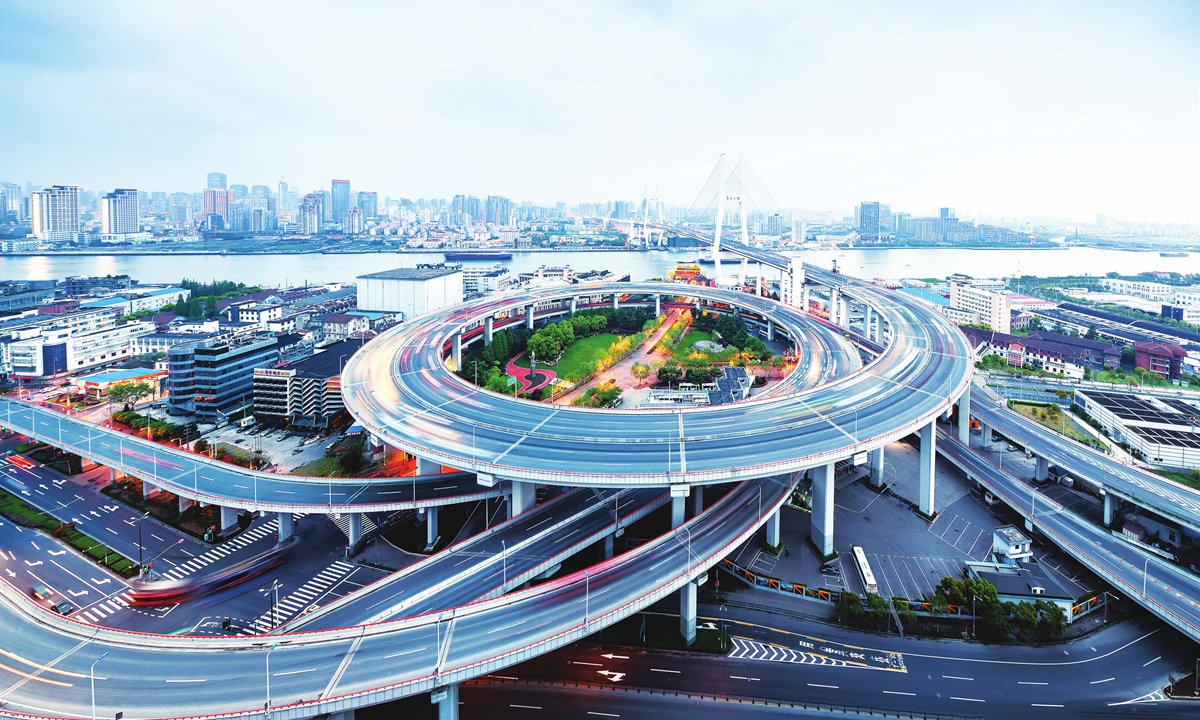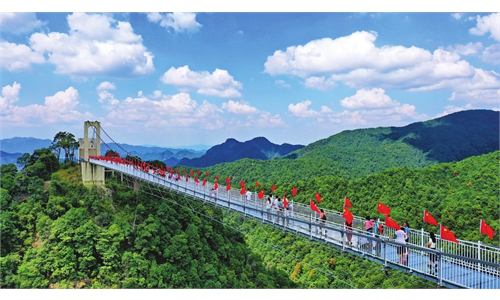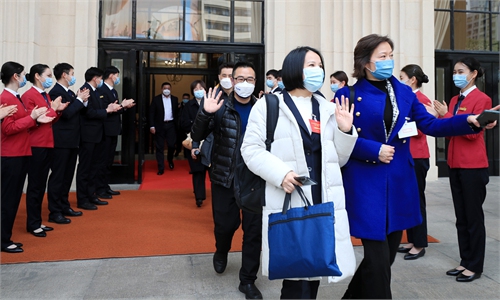
A view of busy traffic in Shanghai. Photo: VCG
Editor's Note:The two sessions, one of China's most important annual political events, is an important window for the outside world to understand China's development achievements, plans, governance philosophy, diplomatic concepts and global initiatives. Through this window, international observers closely watch China's moves and recognize China's development.
"Chinese modernization offers a new option for the modernization of humankind in opposition to the Western system," Deborah Veneziale (Veneziale), an American journalist and a research fellow with Tricontinental: Institute for Social Research, told Global Times (GT) reporter Wang Wenwen. She believes that it is unlikely the countries of the Global South will ever again follow the Western path of modernization.
This is the sixth interview of this series over the two sessions.
GT: The two sessions is the first major political event after the 20th National Congress of the Communist Party of China (CPC). What are your expectations for this year's two sessions? Are your expectations met during the ongoing two sessions?
Veneziale: By examining the report to the 20th National Congress of the CPC and analyzing the international situation, I expect that the two sessions will deal with at least three major and significant issues: economic development, the steady and increasingly aggressive stance against China by the US, and the Taiwan question. Let's take each one separately.
First, economic growth: The combination of the decisive and humane dynamic zero-COVID policy and the slow but deliberate de-coupling of the US from and the sanctions against China, have negatively impacted the Chinese economy. The two sessions discussed how to expedite economic recovery, and how to achieve the 5 percent growth target set by the CPC for 2023.
Second, preparing for the military defense and security of China: A week no longer passes without either a US military or political figure declaring that war with China is inevitable and that the US must ready itself. In late January, four-star General Mike Minihan issued a memo to his troops saying, "My gut tells me we will fight in 2025," and then gave reasons as to why China would start this war. The reality is the exact opposite. The US has used the ridiculous issue of a balloon to create a fever pitch of hatred of China inside the US to prepare its people for US military action against China. This is an extremely dangerous and irresponsible act.
The US governance system is a far cry from that of China. There are constant battles between various sections of US capital and individual capitalists to protect their selfish and narrow interests. The political elites squabble on domestic matters in this period of the slow decline of the "American Empire." However, Joe Biden's visit to Ukraine along with Antony Blinken's rude and arrogant behavior during and after the Munich Security Conference show that the central direction of the US political elites is to aggressively create a zone of countries dedicated to war. Sadly, and not surprisingly, the European elites (especially those who didn't participate) have stayed completely silent on the dramatic exposé by the well-regarded investigative journalist Seymour Hersch that it was the US who blew up the Nord Stream pipeline.
Third, the Taiwan question: The focus of US espionage and "color revolution" activity against China is now Taiwan. Pro-reunification forces are suppressed, and the US continues to arm Taiwan and illegally and secretly train its forces. Political cover for these machinations is provided by all sides of the US political elites. Michael Chase, US deputy assistant secretary of defense for China, visited Taiwan on February 17. Democratic Party "liberal" Rep. Ro Khanna of California and others arrived on February 20.
The time for peaceful reunification, regardless of the form that may take, seems to be closer at hand. The US has no regard for national sovereignty and pursues intervention in the internal affairs of other countries at will. I often ask American acquaintances how they would react if China were to arm the Hawaiian native population (the original inhabitants of Hawaii who were brutally murdered and stripped of their land and sovereignty by the US) and defy the US government to intervene. Their answer is a resounding "We would forcibly remove both the arms and training personnel and take back the state!" No one has ever answered, "We would negotiate for 50 years!"
GT: How do you view China's whole-process people's democracy? What are the misperceptions about it in the West? What are the advantages of China's democratic system over the Western one?
Veneziale: I just arrived in Beijing recently, so my concrete knowledge of whole-process people's democracy is very nascent. Living abroad and having to rely mainly on books, social media, and news organizations, doesn't really provide a real-life understanding of how China's democracy functions. However, I had an experience the other day when I was taking a walk in a Beijing residential area that provided a small but particularly insightful example of what people's democracy means.
I came upon a sign that listed four rules of conduct for the area. It was not only the content that intrigued me and provided insight, but it was the order in which the rules were written. They were as follows: "Please Take Care of Children and Elderly;" "Please Do Not Step on the Plants;" "Central Walking Street, Please Slow Down;" and "No Smoking and Tobacco." My immediate reaction was the people-centered approach in asking the residents to be socially responsible and look out for each other and nature.
Democracy isn't an abstract concept; it is not only demonstrated by political structures and governance. There is a very emotional side to China's people's democracy, putting people first not only in the grand scheme of things, but also in the relationships between people, how respectful people are of others and their surroundings. When there is a people's democracy, as evidenced by the way in which the Communist Party of China has established China's true representative government, there is a different feeling that permeates society.
As the Chinese governance structure becomes more inclusive, and the economic, political and social levels of the people are elevated, the people's participation becomes greater and the people's democracy becomes stronger. Compare this to the US where in the last few years many states passed restrictive voting laws. In comparison with the growth of socialism and people's democracy, there is the decay of capitalism.
GT: The two sessions will flesh out the Chinese modernization blueprint with specific targets to strive for. How do you interpret "Chinese modernization?"
Veneziale: This model offers a new option for the modernization of humankind in opposition to the Western system.
Fundamentally, in the centuries-long history of Western hegemony, "modernity" has been equated with "Westernness." The West acquired the "so-called original accumulation" of capital through brutal plundering, colonization, and the slave trade, and destroyed the basis for development of the colonized countries in the Global South. The Western system of "modernization" does not offer the Global South the opportunity to develop. Rather, privatization and open markets have resulted in sucking the life out of the working classes in the neo-colonies. This Western system does not address the key question of the need for genuine political sovereignty in the Global South, nor does it answer the question of how it can gain the ability to "stand up" as China did in 1949.
China's modernization, by contrast, redefines and de-stigmatizes the concept of "modernization" from a socialist perspective. China's model of large-scale modernization (both in population and land mass) has involved and benefited the entire Chinese population. China has fully eradicated absolute poverty, achieved universal nine-year compulsory education, and covered more than 95 percent of its population with basic health insurance.
The Chinese modernization is sustainable because it neither plunders other countries nor nature. In the past decade, an amazingly short period of time, China has led the world in reversing the inevitable historical consequences of industrialization. No other major country in human history has modernized to this level without invading and plundering other countries. It is unlikely that the countries of the Global South will ever again follow the Western path of modernization.
GT: What are the lessons that the Chinese modernization can provide to other countries in the world?
Veneziale: While there are significant economic possibilities for the use of the Chinese path to modernization by other countries in the Global South, we cannot take this modernization model out of the political context in which it developed. From a historical perspective, the Chinese people have traveled a long and difficult journey to arrive to where they are today. The 1949 Chinese Revolution was, first and foremost, a political revolution, led by the CPC, rooted in the mass line, and culminated in a years-long struggle against Japanese imperialism for national liberation and then against the US-backed Kuomintang for a socialist revolution. China's ability to pave this path to modernization was only possible because of the "people's democratic dictatorship." The progressive and left movements in the Global South understand the necessity for this political struggle and while many Global South peoples' movements and governments have made progress in building more equitable and freer societies, the political struggle against US imperialism is not finished.



